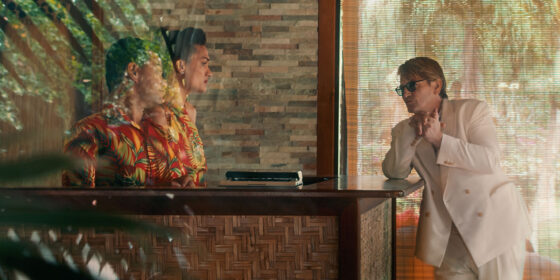TIFF 2022 | Pacifiction (Albert Serra, France/Spain/Germany/Portugal) — Wavelengths

By Mark Peranson
Published in Cinema Scope #91 (Summer 2022)
The prototypical wild-card Cannes Competition selection—albeit one with a French star, almost entirely in French (with a smattering of Portuguese and English), and kind of “about” French colonialism and politics, in a satisfyingly murky kind of way—Pacifiction landed as a life-saving UFO to reveal much that preceded it at Cannes as tomfoolery. The latest entry in an ongoing search for an anti(hetero)-normative filmmaking, in terms of both process and output, Pacifiction follows perhaps Serra’s most audience-unfriendly (and anti-normative) feature, Liberté (2019), and is the closest thing to perfect he can perhaps allow himself to do. Despite the echoes in Pacifiction of such films as Chinatown (1974) or Saint Jack (1979) or the literary creations of Graham Greene and Joseph Conrad, the true patron saints hovering over Serra’s South Seas are once more Fassbinder and Warhol, and the narrative DNA—there is a plot here, even if it is not fully resolved (although it fails to resolve in a very satisfying manner)—can be traced back to Serra’s underseen 13-hour installation masterpiece, Singularity (2015), which Serra has described as “a fictitious world built around an idea…not so much a dramaturgy of action or representation, but rather of presence.”
What could account for the wider recognition paid to Serra this time around—aside from a more traditional edit, length notwithstanding—might be attributed to the presence of the newest addition to his ensemble, Benoît Magimel. Magimel, in his double-breasted white suit and constant shades, commands the screen as the logorrheic, personable High Commissioner De Roller, a bearish man of many monologues who never met a pot of honey he couldn’t resist tasting. Scanning at times as a somewhat less scuzzy Denis Leary (or even Chris Farley) but ultimately entirely Serra, Magimel’s De Roller is a big ego who is at once a political pacifier, a cultural attaché, a Don Juan, a high-seas jet-skier (how exactly is he going to “help” the local surf champion?), and, confirming the reading of him as a directorial surrogate, even seemingly a dramaturg to a local theatre troupe rehearsing for a costumed performance that involves live on-stage cockfighting.
As we meet and come to know De Roller, we believe him to be altruistic, but when meeting with local politicians on a small island he acknowledges he’s being “squeezed like a lemon” by all of these demands. The self-doubt and paranoia set in because the trust he’s placed in the French government that he serves is being disabused, and, even worse, it happens behind his back. In a film in which characters ominously lurk in the background and rumours are constantly being spread, the one that propels the drama is that, after 20 years, the French are set to resume nuclear testing in the islands. And that, for good reason, makes the natives restless. (One thing that might surprise viewers is the respect the film pays to the Polynesian residents, who are rewarded major parts in the film—the standout being RaeRae/Mahu third-gender actor Pahoa Mahagafanau, who plays Shannah, hotel desk clerk and object of De Roller’s affections—and certainly come across as superior to their French colonizers.)
But the presence of a minor Gallic celebrity isn’t enough to account for this success. After all, Serra’s entry to Cannes’ big league, La mort de Louis XIV (2016), starred none other than Jean-Pierre Léaud (admittedly spending 90 percent of the film in bed), and we all know about the superstar who is Lluís Serrat, here ADR-ing himself in French on the staff of Morton’s, a Fassbinderian nightclub run by a lamé-sporting Sergi López. There is also the full-blown Tahitian ambience, achieved through tropical melodies (Marc Verdauger’s pulsating, mood-setting score is what film music should be) and local colour: in a film that gets progressively darker both metaphorically and literally, Artur Tort’s cinematography wrings wonders out of the chromatic spectrum, from the red skies at dusk established in the opening shot to the disco blues of the interiors of Morton’s, where, in the film’s last act, Liberté’s Comte Marc Susini, here playing a French admiral (the contemporary equivalent), takes to the dance floor to Freddy Butler’s Detroit soul track “I Like Your Style” (itself a decent red-carpet tune). And, being Tahiti, the verdancy of nature is omnipresent, betraying a potentially terrifying island in not-so-hidden decay—an impression that is driven home by a creepy encounter between De Roller and two interlopers shot in a fascinatingly dilapidated glass-walled, modern hotel.
And then there’s the unmistakable deep-blue waters of the South Pacific. The jaw-dropping moment that seals Pacifiction’s appeal and makes the rest of the film irresistible comes offshore, as De Roller—barefoot, but still wearing the white suit—bobs alongside crashing 50-foot waves as one of many onlookers to a surfing competition. While Michael Mann has likely never been cited as an analogue for Serra, this type of epic scene is only graspable by a fearless filmmaker whose well-known three-moving-camera setup, which produces long takes resulting in hundreds of hours of footage, leaves literally anything open to happen during a shoot in terms of capturing images or improvising dialogue, and also allows for flexibility in terms of locations (and what locations they found), or, indeed, convincing Benoît Magimel to risk his life on a jet ski. It’s an openness to the deep mysteries of the world, and an invitation to imagine a cinema where abstract concepts find concrete expressions, yet all the while allowing oneself to get lost in it and enjoy as, like all of Serra’s work, Pacifiction is funny.
Mark Peranson

